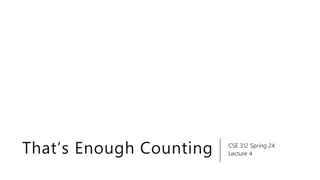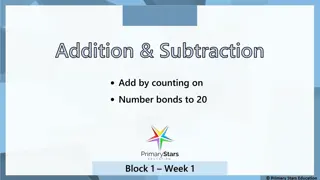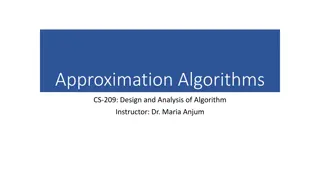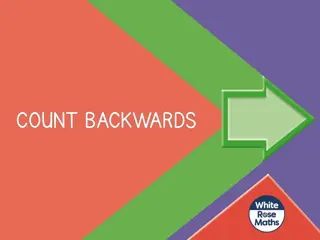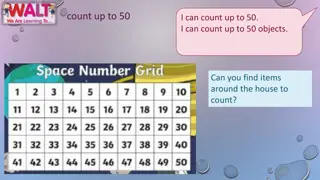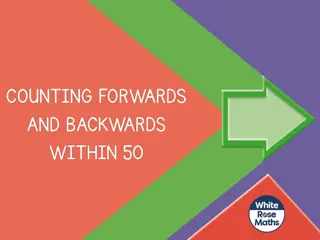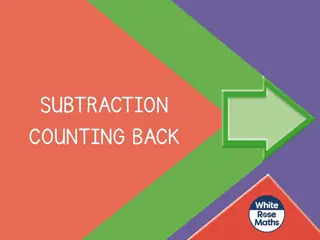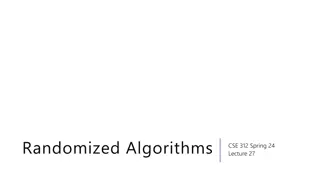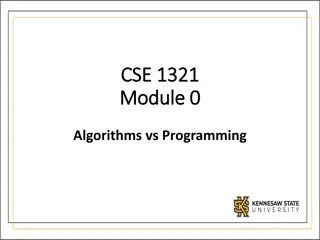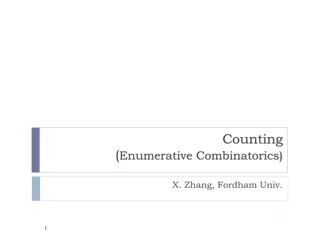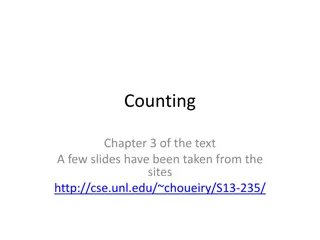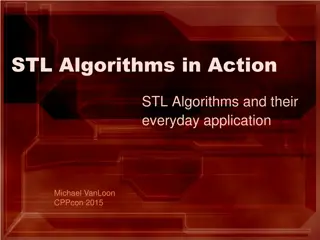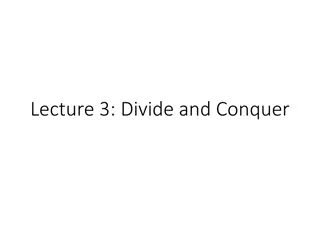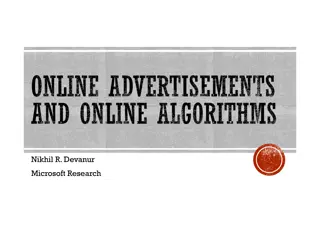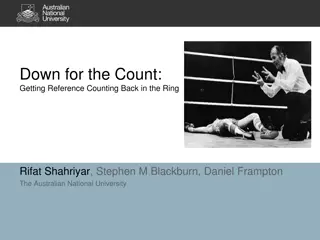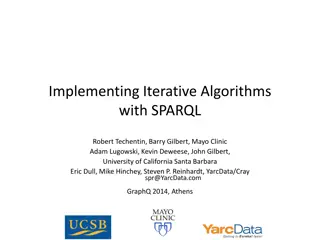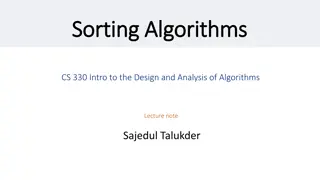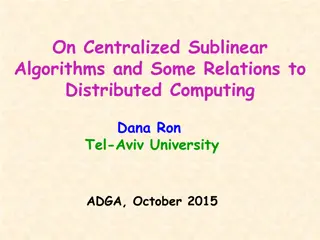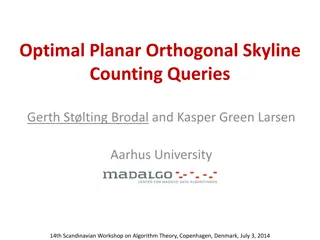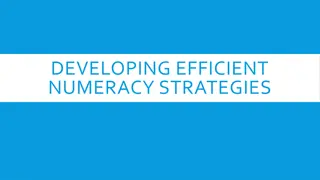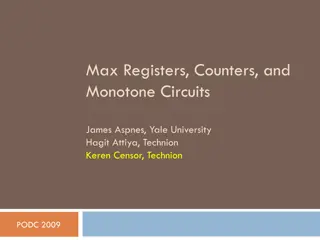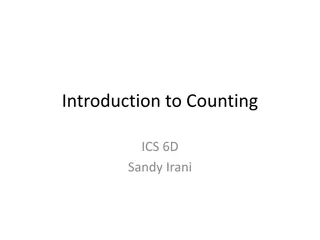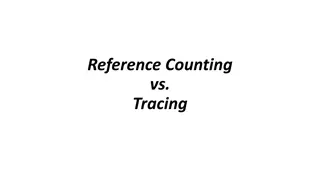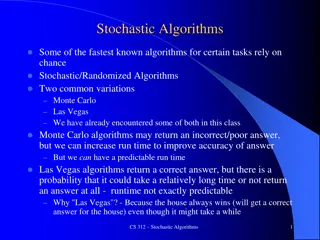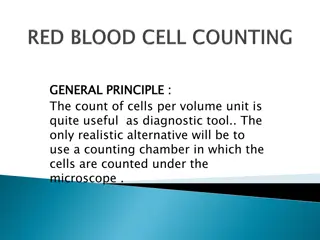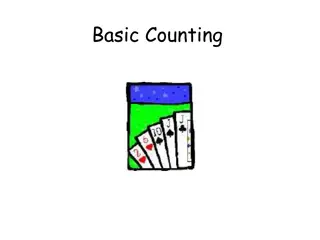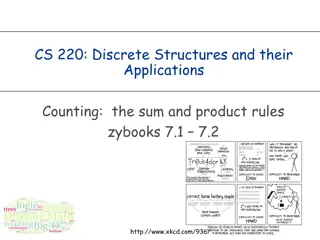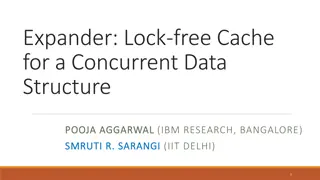Vi-CELL.BLU - Advanced Cell Counting Instrument
Vi-CELL.BLU is a cutting-edge cell counting instrument that offers faster analysis, increased resolution, and improved optical sensor technology for enhanced cell concentration and viability assessments. The device features a user-friendly interface, Trypan blue method for live cell detection, and a
1 views • 19 slides
Understanding Algorithms and Programming Fundamentals
Learn about algorithms, programming, and abstraction in computing. Explore the definition and properties of algorithms, the relationship between algorithms and programming, and the concept of abstraction. Discover how algorithms are like recipes and how abstraction simplifies complex tasks in comput
1 views • 17 slides
Understanding Counting Methods in Probability
This content provides an overview of counting methods for computing probabilities, including combinations and permutations with or without replacement. It explains concepts like permutation with replacement using examples, such as finding possible combinations of letters with repetition allowed. The
0 views • 30 slides
Counting Principles and Pigeonhole Principle Explained
Explore the concepts of counting principles and the pigeonhole principle through practical examples and tips. Learn how to apply these principles to solve problems effectively. From understanding basic counting rules to the advanced pigeonhole principle, this content provides insights and guidance o
0 views • 35 slides
Addition and Subtraction: Counting On Number Bonds to 20 - Block 1 Week 1
In this lesson, students practice addition and subtraction by counting on using number bonds to 20. They learn to add by counting on and solve simple word problems involving adding and subtracting numbers. The lesson includes visual aids and reasoning exercises to reinforce understanding.
0 views • 7 slides
Near-Optimal Quantum Algorithms for String Problems - Summary and Insights
Near-Optimal Quantum Algorithms for String Problems by Ce Jin and Shyan Akmal presents groundbreaking research on string problem solutions using quantum algorithms. The study delves into various key topics such as Combinatorial Pattern Matching, Basic String Problems, Quantum Black-box Model, and mo
0 views • 25 slides
Understanding Approximation Algorithms: Types, Terminology, and Performance Ratios
Approximation algorithms aim to find near-optimal solutions for optimization problems, with the performance ratio indicating how close the algorithm's solution is to the optimal solution. The terminology used in approximation algorithms includes P (optimization problem), C (approximation algorithm),
2 views • 10 slides
Counting and Number Recognition Activities
Engage in a variety of counting and number recognition activities, including identifying numbers, counting backwards, and identifying missing numbers on number tracks. These fun exercises encourage children to practice their counting skills and improve their number recognition abilities.
0 views • 13 slides
Fun Counting Activities for Kids at Home
Engage your child in interactive counting activities using everyday items found around the house. Practice counting up to 50 objects, listen and count as counters are dropped into a jar, and create whole-part models based on different scores. Keep learning fun and educational with these entertaining
0 views • 4 slides
Math Worksheet for Counting Practice
Engage in counting exercises with visual aids such as number tracks, spotting mistakes, and identifying missing numbers. Enhance counting skills forwards and backwards. Practice identifying numbers before and after given ones through interactive tasks.
0 views • 17 slides
Counting and Subtraction Activities for Elementary Math Practice
Engage in a variety of counting and subtraction exercises with visual aids such as number tracks and number lines to enhance elementary math skills. Practice counting back, subtracting numbers, and solving simple equations through hands-on activities. Strengthen your mathematical abilities with thes
0 views • 12 slides
Combining Graph Algorithms with Data Structures and Algorithms in CSE 373 by Kasey Champion
In this lecture, Kasey Champion covers a wide range of topics including graph algorithms, data structures, coding projects, and important midterm topics for CSE 373. The lecture emphasizes understanding ADTs, data structures, asymptotic analysis, sorting algorithms, memory management, P vs. NP, heap
0 views • 38 slides
Understanding Sequential Counters in Digital Circuits
Sequential counters, comprised of flip-flops, are essential in digital circuits for counting clock cycles. They advance through states based on clock pulses and can measure time intervals. The circuit's output state solely depends on its present state, with transitions occurring at each clock pulse.
0 views • 22 slides
Understanding Randomized Algorithms: A Deep Dive into Las Vegas and Monte Carlo Algorithms
Randomized algorithms incorporate randomness into computations, with Las Vegas algorithms always providing the correct answer but varying in time, while Monte Carlo algorithms occasionally give wrong answers. Quick Sort is a classic Las Vegas algorithm that involves pivoting elements for sorting. Ch
4 views • 21 slides
Understanding Algorithms and Programming: A Visual Introduction
Explore the fundamental concepts of algorithms and programming through visual representations and practical examples. Learn about algorithmic thinking, abstraction, recipe-like algorithms, and the importance of logical steps in accomplishing tasks. Discover how algorithms encapsulate data and instru
1 views • 17 slides
Distributed Algorithms for Leader Election in Anonymous Systems
Distributed algorithms play a crucial role in leader election within anonymous systems where nodes lack unique identifiers. The content discusses the challenges and impossibility results of deterministic leader election in such systems. It explains synchronous and asynchronous distributed algorithms
2 views • 11 slides
Counting Strategies and Examples in Enumerative Combinatorics
Understanding counting principles in enumerative combinatorics is essential for solving mathematical problems involving permutations and combinations. The concepts discussed include calculating probabilities, determining the number of outcomes, and applying counting rules to various scenarios such a
1 views • 69 slides
Mathematical Analysis of Algorithms in CMPE371 - Fall 2023-2024
Explore the mathematical analysis of algorithms in CMPE371 for Fall 2023-2024, focusing on non-recursive and recursive algorithms. Learn how to analyze non-recursive algorithms by deciding on input size parameters, identifying basic operations, and simplifying summations. Dive into recursive algorit
1 views • 31 slides
Pseudodeterministic Algorithms and Their Application in Search Problems
Pseudodeterministic algorithms provide a unique approach to the search problem associated with binary relations, offering an error reduction technique while sacrificing the ability to approximate the average value of a function. By introducing m-pseudodeterministic and pseudo-pseudodeterministic alg
1 views • 6 slides
Understanding Combinatorics and Counting in Mathematics
An exploration into combinatorics, focusing on arranging objects and counting possibilities. From dividing polygons to listing objects, delve into the world of counting and arrangement. Learn how counting plays a vital role in algorithms and probability, and discover the complexity it adds to variou
0 views • 117 slides
Understanding STL Algorithms: A Practical Guide
Explore the world of STL algorithms through an insightful discussion on the definition of algorithms, the advantages of using STL algorithms over raw loops, and the different classes of STL algorithms available. Discover how these pre-built libraries can enhance your programming efficiency and code
1 views • 99 slides
Exploring the Role of Algorithms in Game Design
Delve into the world of algorithms in game design, from understanding the fundamental concept of algorithms to their pervasive presence in various aspects of gaming, such as military simulations, medical simulations, and gameplay mechanics. Explore how algorithms shape experiences in different types
0 views • 10 slides
Evolutionary Computation and Genetic Algorithms Overview
Explore the world of evolutionary computation and genetic algorithms through a presentation outlining the concepts of genetic algorithms, parallel genetic algorithms, genetic programming, evolution strategies, classifier systems, and evolution programming. Delve into scenarios in the forest where gi
0 views • 51 slides
Efficient Algorithms: Divide and Conquer Techniques
Using the Divide and Conquer approach, this lecture discusses strategies for efficiently solving problems such as counting inversions in arrays and integer multiplication. By dividing tasks into smaller subproblems, sorting, merging, and efficiently counting operations, the algorithms presented opti
1 views • 13 slides
Online Advertising and Algorithms: Insights and Simplifications
Explore the world of online advertisements and algorithms through insightful discussions on online advertising, modern developments in online algorithms, and practical optimization strategies like budgeted allocation. Delve into topics such as decision-making under uncertainty, accessing algorithms,
1 views • 22 slides
Reviving Reference Counting: A Comprehensive Analysis
Background garbage collection techniques like tracing and reference counting are crucial in managing memory in different settings. This article delves into the historical context, advantages, disadvantages, and challenges of reference counting in garbage collection. It presents an in-depth analysis
0 views • 35 slides
Implementing Iterative Algorithms with SPARQL
This comprehensive guide explores the implementation of iterative algorithms with SPARQL, focusing on YarcData/Cray's approach to using these algorithms. It covers YarcData's interest in graphs, the Urika appliance, iterative algorithms in machine learning, implementation approach, and algorithms im
1 views • 12 slides
Overview of Sorting Algorithms and Quadratic Sorting - CS 330 Lecture Notes
Sorting algorithms play a crucial role in computer science and computing tasks, consuming a significant portion of computing power. Various algorithms such as Bubble Sort, Selection Sort, and Insertion Sort are discussed for sorting a list of values efficiently. Quadratic sorting algorithms like Sel
0 views • 30 slides
Understanding Sublinear Algorithms and Graph Parameters in Centralized and Distributed Computing
Centralized sublinear algorithms and their relation to distributed computing are explored, emphasizing the efficiency of algorithms in processing large inputs in sublinear time. Examples of sublinear algorithms for various objects are provided, along with the computation and approximation of graph p
1 views • 34 slides
Advanced Techniques for Orthogonal Skyline Counting Queries
Advanced techniques for orthogonal skyline counting queries discuss optimal planar solutions, dividing and conquering for topmost point identification, efficient vertical slab counting, succinct data structures for prefix sums and range maxima, upper bounds on degree and multi-slab queries, as well
0 views • 11 slides
Developing Efficient Numeracy Strategies for Students
Students employ diverse methods to solve number problems, from basic counting to advanced arithmetic strategies. An early numeracy project, "Count Me In Too," outlined a learning framework describing the progression of students' strategies. The Emergent Counting Stage focuses on basic number skills,
0 views • 20 slides
CS260 Parallel Algorithms: Theory and Practice Review
This review covers essential topics from the CS260 Parallel Algorithms course by Yihan Sun, focusing on key concepts such as scheduler programs, cost models, reduce and scan techniques, PRAM models, atomic primitives, small algorithms, the master theorem, and sorting algorithms like Quicksort and Me
0 views • 25 slides
Advancements in Counting Algorithms for Multiprocessing Systems
Presentation of key concepts and advancements in counting algorithms for multiprocessing systems, focusing on topics like max registers, counters, and monotone circuits. Discusses the importance of efficient counting in achieving consensus, crash failure requirements, and lower bounds for time compl
0 views • 20 slides
Introduction to Counting Techniques in Mathematics
Explore the concept of counting in mathematics using techniques like the Product Rule and Sum Rule. Learn how to calculate the number of possible choices and selections in different scenarios, such as lunch specials, student council selections, exercise schedules, and counting strings. Understand th
0 views • 15 slides
Comparison of Reference Counting vs. Tracing Garbage Collection Algorithms
Understanding the differences between reference counting and tracing garbage collection algorithms, their challenges, and design spaces. Discussing topics such as storing object counts, maximum reference count distribution, overflow scenarios, and methods for maintaining counts in reference counting
0 views • 23 slides
Exploring Stochastic Algorithms: Monte Carlo and Las Vegas Variations
Stochastic algorithms, including Monte Carlo and Las Vegas variations, leverage randomness to tackle complex tasks efficiently. While Monte Carlo algorithms prioritize speed with some margin of error, Las Vegas algorithms guarantee accuracy but with variable runtime. They play a vital role in primal
0 views • 13 slides
Hemacytometer Cell Counting Procedure
The hemacytometer cell counting method is a valuable diagnostic tool for determining the number of cells in a given volume of fluid. This process involves using a counting chamber under a microscope to calculate the cells per unit volume. By following a systematic approach, including proper dilution
0 views • 12 slides
Fundamentals of Counting Principles in Mathematics
In this lecture, we delve into basic rules for counting, including the sum rule, product rule, generalized product rule, permutations, combinations, binomial coefficients, and combinatorial proofs. We also explore the inclusion-exclusion principle with practical examples such as determining total en
0 views • 51 slides
Understanding Counting Principles in Discrete Structures
Counting serves a crucial role in algorithm design and complexity analysis, enabling us to determine program time and space complexities. This article explores counting principles such as the sum and product rules, Cartesian products, and their applications in solving simple and complex counting pro
0 views • 33 slides
Understanding Lock-Free and Wait-Free Algorithms in Concurrent Data Structures
Illustration of lock-free and wait-free algorithms compared to blocking algorithms, with insights on concurrent object execution, blocking vs. non-blocking algorithms, definitions, comparisons between locks, lock-free, and wait-free approaches, and explanations on making algorithms wait-free. Exampl
0 views • 23 slides



